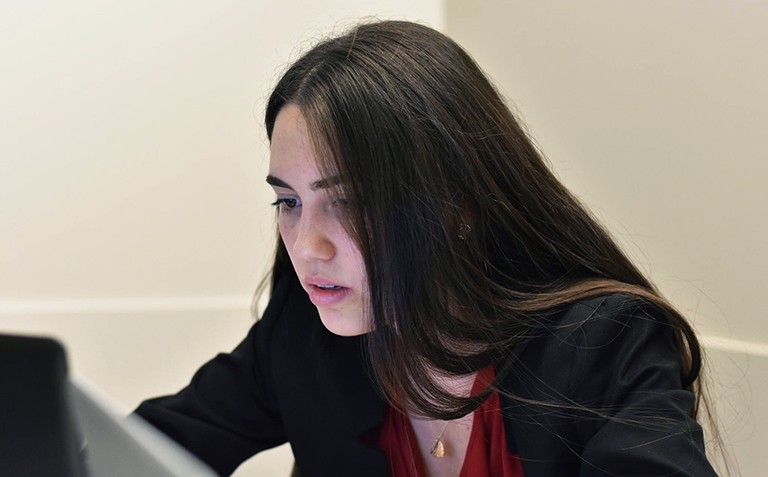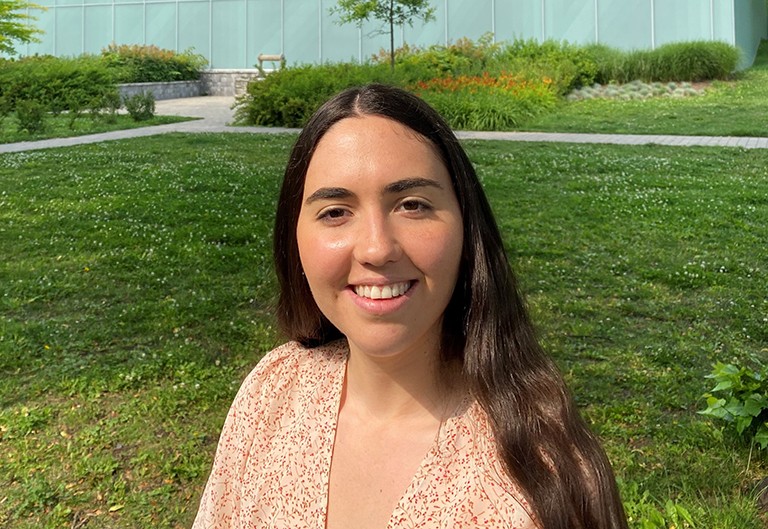Concordia graduate student wins Relève étoile Paul-Gérin-Lajoie award for her work in child studies
 Laura Pareja Conto: “We underestimate how thoughtful and critical youth can be about their social environments.” Photo by Samantha Briand.
Laura Pareja Conto: “We underestimate how thoughtful and critical youth can be about their social environments.” Photo by Samantha Briand.
Laura Pareja Conto, a Concordia MA student in the Child Studies program, has received the Prix Relève étoile Paul-Gérin-Lajoie from the Fonds de Recherche du Québec (FRQ) for the month of March.
Pareja Conto earned the prize in the FRQ’s Society and Culture category for her research paper, “Adolescents’ Retributive and Restorative Orientations in Response to Intergroup Harms in Schools,” published in the Journal of Research on Adolescence.
Three Relève étoile prizes of $1,500 are awarded every month. Eligible research is categorized by Society and Culture, Nature and Technology, and Health.
“This project is very dear to my heart for many reasons. One example is that it was the first project I started working on with my supervisor, Holly Recchia (associate professor of education) and our amazing collaborators: Gabriel Velez from Marquette University, Cecilia Wainryb from the University of Utah, and a previous graduate student in Dr. Recchia’s lab, Angelica Restrepo,” Pareja Conto says.
“As a team, we’re interested in adolescents’ perceptions of restorative and punitive models to address harm. Restorative models are practices and values that prioritize respectful relationships; repairing harms; inclusive dialogue; accountability from individuals and the community, and social engagement.”

The importance of youth perspectives
The researchers based their article on data collected by Restrepo, whose project primarily focused on Colombian youths’ perceptions of the armed conflict in their country. But the dataset also includes student views of peer conflict in schools, which Pareja Conto incorporated into her research.
Examples of peer harm in schools include bullying, conflicts between rival groups and property destruction.
“It’s about finding ways to take the youths’ perspectives as a starting point, and go beyond punitive practices — because there are numerous challenges related to the overuse of these practices in schools,” Pareja Conto says.
Opening a dialogue to improve understanding, positive impacts
Pareja Conto’s research draws on her background in psychology. She says she wants to promote dialogue and understanding among young adults in the aftermath of peer harm, as these experiences can serve as opportunities to learn from each other and build relationships.
“I think sometimes we underestimate how thoughtful and critical youth can be about their social environments. We miss out when we don’t consider their perspectives,” she says.
“Participants in our study did see the value in punishments. But they were also critical of the limits and drawbacks of these practices, including how punishment can be unfair,” Pareja Conto reports.
“Their responses challenge one-size-fits-all approaches to discipline in schools. These youth are critical of the overreliance on punishments such as suspensions and expulsions.”
Read Laura Pareja Conto’s award winning paper, “Adolescents’ Retributive and Restorative Orientations in Response to Intergroup Harms in Schools.”
Learn more about Concordia’s Department of Education.
